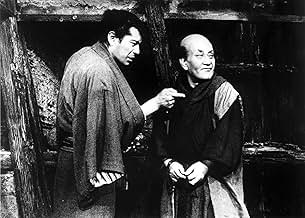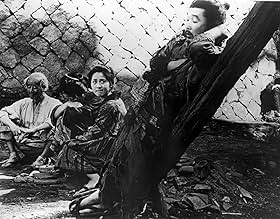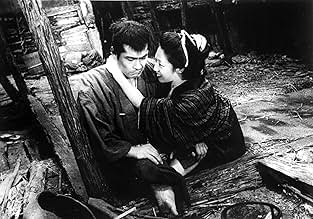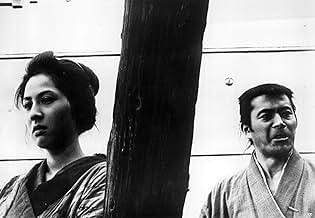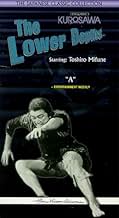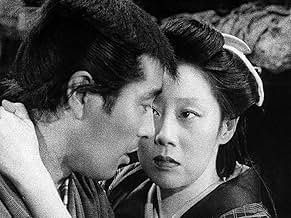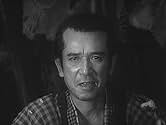IMDb RATING
7.2/10
6.3K
YOUR RATING
In a Japanese slum, various residents play out their lives, dreaming of better things or settling for their lot. Among them is a man who pines for a young woman but is stymied by her decepti... Read allIn a Japanese slum, various residents play out their lives, dreaming of better things or settling for their lot. Among them is a man who pines for a young woman but is stymied by her deceptive family.In a Japanese slum, various residents play out their lives, dreaming of better things or settling for their lot. Among them is a man who pines for a young woman but is stymied by her deceptive family.
- Director
- Writers
- Stars
- Awards
- 5 wins total
Kamayuki Tsubono
- Tradesman
- (uncredited)
- Director
- Writers
- All cast & crew
- Production, box office & more at IMDbPro
Featured reviews
This movie is less easily accessible than other movies by Akira Kurosawa. None of the samurai honor, swordfighting action or visual beauty of his more well known efforts, Still, if you give yourself the time to view and appreciate it, it is a strong, involving movie with better staying power than most of what hits the silver screen in a typical season.
"Donzoko" does not rank among Akira Kurosawa's finest films, but that doesn't mean it should be dismissed, considering the quality of his body of work.
Not many films have explored the moral decadence of humanity in face of poverty such as "Donzoko". It reminds us of how most humans are, deep down, only worried about themselves and their own worldy pleasures.
The inclusion of the "Old Man" gives the film an almost Buddhist insight into the situation of the slum, which helps painting its extremely intriguing - even if limited - canvas.
7.7/10
Not many films have explored the moral decadence of humanity in face of poverty such as "Donzoko". It reminds us of how most humans are, deep down, only worried about themselves and their own worldy pleasures.
The inclusion of the "Old Man" gives the film an almost Buddhist insight into the situation of the slum, which helps painting its extremely intriguing - even if limited - canvas.
7.7/10
It's one of Kurosawa's most neglected masterpieces. "The Lower Depths" takes us into a ravine tenement, run by greedy, brutal landlords, and inhabited by the lowest of society's strata. All action takes place in two locations: the interior of the tenement, or the tenement grounds.
How amazing, then, is the fascination this film exerts on us, with its very modest settings. I am astonished at the creativity of the film shooting these restricted spaces, in so many varied and telling ways: space expands and contracts as is necessary to the story: the outside is either threatening or an escape, but even once outside, we see that there is no escape, and diagonals show us the human dimensions of restricted choice. Space speaks volumes in the film, accompanied by the beauty of the ensemble acting, expressing profound truths.
We find ourselves engaged in the lives of these people, and puzzled over the character of Bokuzen Hidari as the pilgrim. Is he good? If he is good, and pacifies the dispossessed by acknowledging their illusions, does it mean that self-deception is good? What wonderful ensemble acting! The director put them through long, tough rehearsals, and the result is a seamless film. No wrong notes, no overacting, just a beautiful and strange film that haunts us after we've experienced it. Such invisible, great acting, and humor and pathos.
The character of the actor is the finest piece of work by the Kurosawa veteran Kamatari Fujiwara. It is amazing that this actor appears in such diverse roles as Matahichi in "The Hidden Fortress" and as a corrupt executive in "The Bad Sleep Well". What astonishing range and depth! How brilliantly Kurosawa uses the actor's range! And, of course, we have our beloved Toshiro Mifune, laughing, kicking up his heels in devilish delight, trying to impress the girl, pouting with the landlady, listening with suspicion, then respect to the pilgrim...doing so many things so well, we are bereft when he is absent for the film's conclusion.
And what a conclusion! The harsh clappers that end the movie, the frontal shot of the gambler as he addresses us (for the only time in the film) directly, and the sudden end! Gorky...Kurosawa, Bokuzen Hidari, Toshiro Mifune, Kamatari Fujiwara and the rest....they live on in this masterpiece, for which I am very grateful.
How amazing, then, is the fascination this film exerts on us, with its very modest settings. I am astonished at the creativity of the film shooting these restricted spaces, in so many varied and telling ways: space expands and contracts as is necessary to the story: the outside is either threatening or an escape, but even once outside, we see that there is no escape, and diagonals show us the human dimensions of restricted choice. Space speaks volumes in the film, accompanied by the beauty of the ensemble acting, expressing profound truths.
We find ourselves engaged in the lives of these people, and puzzled over the character of Bokuzen Hidari as the pilgrim. Is he good? If he is good, and pacifies the dispossessed by acknowledging their illusions, does it mean that self-deception is good? What wonderful ensemble acting! The director put them through long, tough rehearsals, and the result is a seamless film. No wrong notes, no overacting, just a beautiful and strange film that haunts us after we've experienced it. Such invisible, great acting, and humor and pathos.
The character of the actor is the finest piece of work by the Kurosawa veteran Kamatari Fujiwara. It is amazing that this actor appears in such diverse roles as Matahichi in "The Hidden Fortress" and as a corrupt executive in "The Bad Sleep Well". What astonishing range and depth! How brilliantly Kurosawa uses the actor's range! And, of course, we have our beloved Toshiro Mifune, laughing, kicking up his heels in devilish delight, trying to impress the girl, pouting with the landlady, listening with suspicion, then respect to the pilgrim...doing so many things so well, we are bereft when he is absent for the film's conclusion.
And what a conclusion! The harsh clappers that end the movie, the frontal shot of the gambler as he addresses us (for the only time in the film) directly, and the sudden end! Gorky...Kurosawa, Bokuzen Hidari, Toshiro Mifune, Kamatari Fujiwara and the rest....they live on in this masterpiece, for which I am very grateful.
Kurosawa meant this to be a fairly straightforward filming of the Gorky play and it is. Like most filmed stage plays, it relies heavily on dialogue and a good translation for people who don't speak Japanese. Fortunately, the new Criterion DVD supplies this. You have to get some appreciation for the characters before this film comes alive, which it did for me about half way through. I watched it again and greatly enjoyed the entire film. Unlike the French version with Jean Gabin, Kurosawa does not single out any one character as the focus, which is not easy with Mifune in the picture. (He is not in the last quarter of the film). At first, we seem to have only a mob of quarrelsome boarders in a flophouse, but the personality of each one gradually emerges--the gambler, the actor, the barrel maker, the thief, the prostitute, the former samurai, the priest. Each one alternately harangues and supports the other boarders, while trying to maintain some shred of dignity to themselves. I would not recommend it as an introduction to Kurosawa (try Ikiru or Red Beard) but give it a try. 4 out of 5.
Without it being one of Akira Kurosawa's finest, The Lower Depths is an exceptional film. As with any Kurosawa film it is wonderfully made, with well-crafted sets and fine use of camera work. Kurosawa directs superbly, always with a delicate touch while giving detail and humanity to his stories and characters. And those they do here. The story has a lot of intensity and unsentimental in its telling of lives without hope, and the characters are powerfully written with a lot of humanity. The ensemble playing is really magnificent with the standouts being Toshiro Mifune, charismatic as ever, and Kamatari Fujiwara, who conveys an astonishing range of emotions here. My only real criticism of The Lower Depths is the rather abrupt ending, other than that it is a really well-done film with a lot of things to like about Kurosawa's films present. 9/10 Bethany Cox
Did you know
- TriviaThe entire film was shot mostly in sequence and was finished in about four weeks.
- Quotes
Sutekichi the Thief: Lies trump the truth every time.
- ConnectionsFeatured in The 62nd Annual Academy Awards (1990)
- How long is The Lower Depths?Powered by Alexa
Details
- Runtime
- 2h 17m(137 min)
- Color
- Sound mix
- Aspect ratio
- 1.37 : 1
Contribute to this page
Suggest an edit or add missing content

